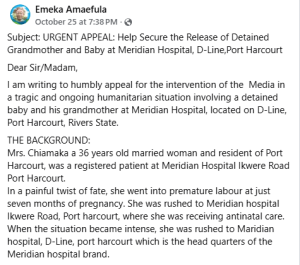Rivers state government intervenes after hospital where deceased woman had her baby, allegedly detains the child and grandmother for one year over unpaid bills
When Bills Overshadow Birth: Rivers State Hospital Case Sparks Debate on Patient Rights
A recent story from Rivers State has brought fresh attention to how hospitals handle medical bills — and what happens when families can’t pay. According to reports shared online, a hospital allegedly held a newborn baby and his grandmother for about a year because of unpaid bills after the baby’s mother died during childbirth.
The shocking case has drawn public outrage and prompted the Rivers State government to step in, raising serious questions about hospital billing practices, patient rights, and the need for reform.
What Happened
-
A woman went to a hospital to deliver her baby, but sadly passed away during childbirth.
-
Her baby survived and needed ongoing medical care, including time in an incubator.
-
The hospital reportedly billed the family about ₦6 million, of which only ₦1.4 million was paid.
-
Because the rest wasn’t settled, the hospital allegedly detained the baby and his grandmother for nearly a year.
The story went viral online, prompting an investigation by Rivers State Commissioner for Health, Adaeze Oreh, who confirmed that the ministry was already looking into the case.
 The Bigger Issue: When Debt and Healthcare Collide
The Bigger Issue: When Debt and Healthcare Collide
This incident highlights a painful reality — for many families, hospital bills can become a crisis of their own. Hospitals need funds to operate, but detaining patients (or their relatives) over unpaid bills raises serious ethical and legal concerns.
No one — especially a newborn — should be caught in a tug-of-war between financial obligations and basic human rights.
What This Says About Patient Rights
The case forces us to ask:
Should a hospital ever hold a patient or family member because of debt?
Even when care costs are high, detaining someone violates their right to freedom and dignity. It also puts vulnerable people — like infants, elderly caregivers, or grieving families — in even more distress.
Hospitals need clear, humane policies for handling unpaid bills. That means:
-
Transparent billing and clear payment terms.
-
Compassionate consideration for families facing hardship.
-
Independent reviews when billing disputes arise.
Government Response
The involvement of the Rivers State government shows that this is more than a hospital issue — it’s about public trust and accountability in healthcare.
A proper inquiry can help prevent future cases, hold institutions accountable, and set fair standards for how hospitals handle debts.
What Needs to Change
This case is a wake-up call for reform. Policymakers and hospital administrators could:
-
Standardise hospital billing and provide clear, written payment plans.
-
Create patient rights charters that prohibit detention over unpaid bills.
-
Monitor debt collection practices in healthcare.
-
Expand medical support programs to help families with catastrophic bills.
-
Offer complaint channels so patients can safely report rights violations.
Lessons for Patients and Families
If you ever face a hospital billing dispute:
-
Ask for an itemised bill and a written explanation of charges.
-
Keep records of all conversations with the hospital.
-
Know your patient rights and contact health authorities or legal aid if you feel mistreated.
-
Seek out medical support programs or charity funds that might help reduce costs.
Why This Matters
Stories like this remind us that access to healthcare isn’t just about having hospitals — it’s about fairness, compassion, and protection for those in crisis.
When hospitals become debt collectors, the focus shifts from healing to hardship. That’s not the kind of system anyone deserves.
Whether every detail of this case proves true or not, it raises a crucial point: patients and newborns deserve care, not captivity.
The Rivers State controversy could become a turning point — pushing for laws and policies that protect patients, promote transparency, and ensure no family ever faces such trauma again.



